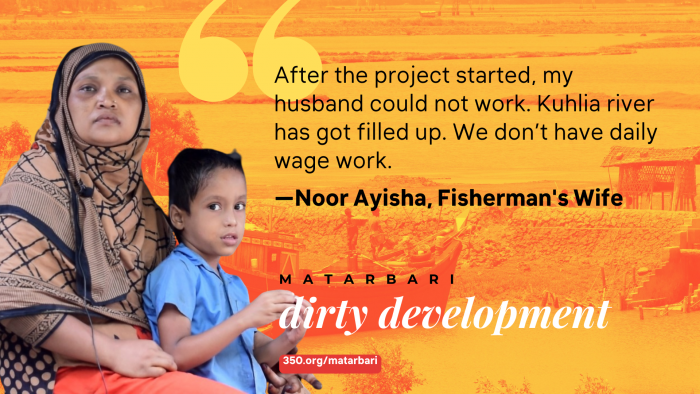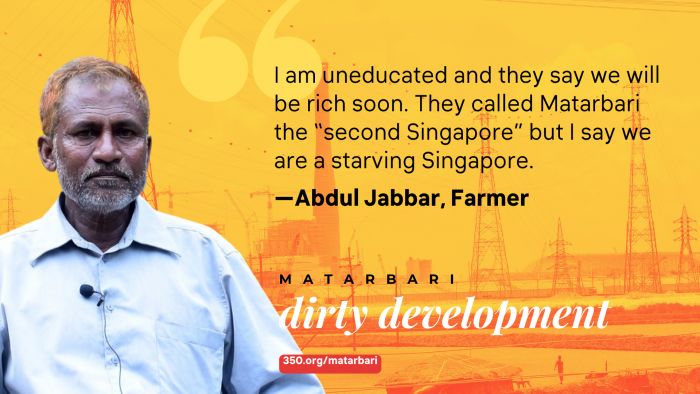350
Dirty Development
Matarbari and Dirty Development
Matarbari Island is located next to one of the major coastal areas of Bangladesh.
Known for its natural beauty, long sandy shorelines, wildlife sanctuaries, marine reserve, and home to communities that live in harmony with their natural surroundings, they are now threatened by a Japan-funded Matarbari Phase 1 coal plant.
Densely populated and home to an estimated 90,000 people who rely on shrimp farming and salt cultivation for their livelihoods. That changed in 2013 when communities were forced out of their homes to make way for coal plants and related infrastructure. Many affected families were not adequately compensated and provided alternative livelihoods.
Japan can use its technical knowledge to support Bangladesh’s leapfrog in its renewable energy transition. Bangladesh will benefit from Japan’s investment, and global solar and wind energy costs will decline.
“Dirty Development,” a short film produced by 350.org, sheds light on the real cost of the Matarbari coal plant and challenges this development narrative by rich countries like Japan that fossil fuels are the only way to usher in improvement in the quality of life. We all have a role to play in supporting the affected communities in Matarbari, Bangladesh, by uplifting their stories.
Be the megaphone for the people of Matarbari. Watch and share their story now:
Watch
“They even call our Matarbari the “Second Singapore,” but I say we are a starving Singapore”
In Matarbari, the Phase 1 coal plant:
Located on a densely populated island in Cox’s Bazar district that is home to 100,000 people, the Matarbari coal plant will bring devastation to the community instead of the development that JICA has promised.
Matarbari Phase 1 coal plant will cause up to 14,000 premature deaths during its operational years, according to Greenpeace. Air quality in parts of Bangladesh is already ranked among the worst in the world.
The Matarbari Phase 1 project fails to meet JICA’s Guidelines for Environmental and Social Considerations, which state that communities affected by its projects must be compensated at full replacement cost. The guidelines also state that countries hosting JICA projects must make efforts to enable people affected to improve their standard of living and their income opportunities to be restored to pre-project levels.
Two turbines of the Phase 1 plant were built on land meant for shrimp farming, crops, and salt production, the disturbance of which has destroyed the livelihoods of people in Matarbari. Those displaced by the project were not given prior notice as required by the Land Acquisition Act of 1982 nor given any fair compensation for damages.
Five wildlife sanctuaries and six forests across the Chattogram region have been projected to be immensely affected due to the potential emission from these plants.
A study by CREA assessed that a total of 32.6kg mercury and 184kg fly ash would be deposited per year into 11 forests and wildlife sanctuaries, endangering the greeneries and its wildlife that is already bearing the brunt of development projects, loggings, grabbing and deforestation.
Japan’s continued support for coal and funding of the Matarbari coal plant projects in Bangladesh undermines the effort for a just transition to renewable energy.
Read more:
Download the report
This Human Rights Day, let’s stand in solidarity with the communities in Matarbari, Bangladesh. For years, they’ve been bearing the brunt of coal plant projects’ impacts to their health, lands, and livelihood. This must stop now.
Sign up to show your solidarity with Matarbari communities who are fighting for their rights to live in dignity, to have the freedom to choose a sustainable and clean energy supply, and to seek justice for the damages they have endured from dangerous fossil-fueled development.
Be the megaphone for the people of Matarbari. Add your name now.
Excerpts from the film
Here are some quotes from the people living in the region.
“The river has no depth, the river got filed up. After one hour of rain, our house goes underwater ”


Information:
Matarbari Coal Plants
Japan is building a 1320 MW coal plant in Matarbari in Bangladesh and has conducted an Environmental Impact Assessment for the 2nd coal plant of 1320MW. In February 2022, Japan announced its plan not to fund the Matarbari 2 coal project. But this project is far from over.
The JICA-funded Phase 1 of the Matarbari coal plant is already mired in controversy. The first two turbines of the Matarbari plant (Phase 1) were built on land for shrimp farming, crop, and salt production, which has destroyed the livelihoods of Matarbari residents.
Those displaced by the project were not given prior notice as required by the Land Acquisition Act of 1982, and have not been met with fair compensation, livelihood restoration, and resettlement. Some had to pay 30 per cent as a bribe to get the compensation. Only a fraction of the 1,057 people previously employed by the salt and shrimp farm have found alternative employment.
A series of cost hikes and an extended project timeline will make Matarbari 1 one of the most expensive coal-fired power plants in Asia. It was initially scheduled to become operational by 2024 but delayed to December 2026.